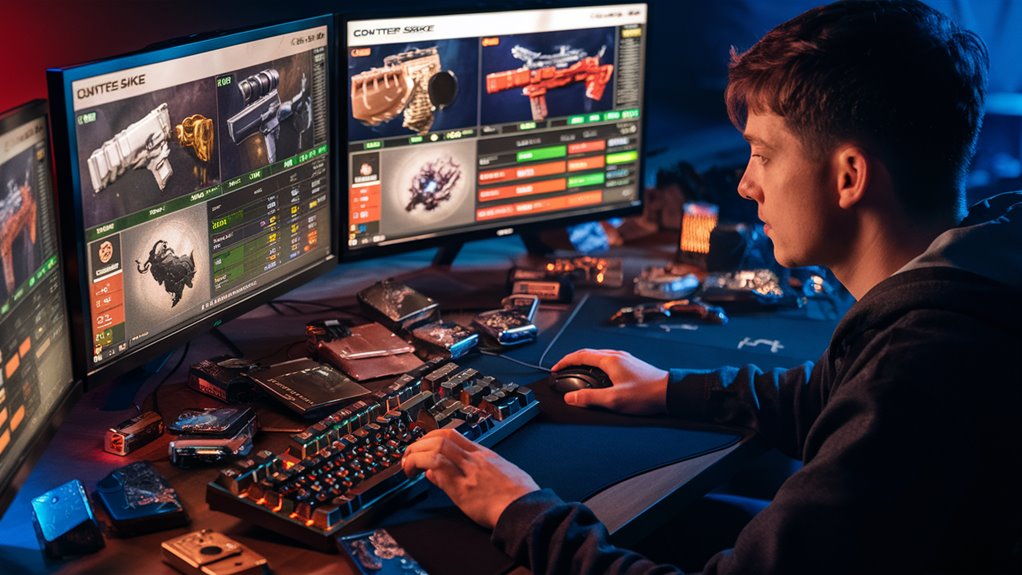How Is Esports Gambling Revolutionizing the Betting Industry?
Key Takeaways
- Esports betting combines real-time analytics and blockchain technology to create new wagering opportunities
- Mobile-first platforms and virtual item betting are attracting younger demographics
- Traditional sports betting revenue faces disruption from esports innovations
The esports gambling market is transforming traditional betting through technological integration and innovative wagering methods. Real-time data analytics and blockchain technology have created unprecedented opportunities for instant micro-betting and virtual item wagering, particularly appealing to tech-savvy younger audiences.
Modern Betting Technologies
- Real-time analytics for instant betting decisions
- Blockchain-powered transaction systems
- Mobile-first betting platforms
- Virtual item wagering capabilities
Impact on Traditional Betting
Traditional sports betting, while still dominant in revenue, faces significant disruption from esports gambling innovations. Key changes include:
- Faster betting processing
- More diverse betting options
- Enhanced user engagement
- Improved data security
Future Implications
The integration of esports betting technologies signals a fundamental shift in gambling markets:
- Expanded demographic reach
- New revenue streams
- Innovation in betting products
- Enhanced user experience through technology
The transformation of gambling through esports betting continues to accelerate, reshaping industry standards and creating new opportunities for both operators and bettors.
The Rise of Digital Wagering

How Is Digital Wagering Transforming the Esports Industry?
Key Takeaways:
- Digital wagering platforms have revolutionized esports betting through cryptocurrency integration
- Live streaming services enable real-time betting during matches
- Data-driven analytics provide unprecedented betting options for esports competitions
The Evolution of Esports Betting Platforms
Digital wagering platforms have fundamentally transformed esports betting by integrating cryptocurrency and instant payment systems.
These platforms enable seamless cross-border transactions, attracting a tech-savvy demographic that prefers digital entertainment to traditional sports betting.
Real-Time Streaming and Betting Integration
The convergence of live streaming platforms like Twitch with betting services creates an immersive wagering experience. Viewers can now:
- Place bets while watching matches
- Access instant odds updates
- Participate in live betting markets
- Track their wagers in real-time
Advanced Analytics and Betting Options
Modern esports betting leverages comprehensive game data to offer sophisticated wagering options:
- Match winner predictions
- In-game event betting
- Player performance statistics
- Map-specific outcomes
- Kill count wagers
Market Growth and Industry Adaptation
The esports betting market demonstrates significant expansion:
- Traditional bookmakers are developing dedicated esports divisions
- Popular games like League of Legends, CS:GO, and Dota 2 drive market growth
- Complex betting markets emerge beyond basic match outcomes
- Industry projections indicate billions in annual revenue potential
This digital transformation continues to reshape the gambling landscape, creating new opportunities for both operators and bettors in the esports ecosystem.
Traditional Vs Esports Betting Markets

How Do Traditional Sports and Esports Betting Markets Compare?
Key Takeaways
- Traditional betting focuses on established sports statistics while esports adapts to evolving gameplay
- Esports offers unique game-specific betting options not available in traditional sports
- Demographic differences shape betting behaviors and market dynamics
- Digital integration creates more sophisticated betting experiences in esports
Market Structure and Betting Options
Traditional sports betting and esports wagering operate in fundamentally different ways.
Traditional betting markets rely on established sports with decades of statistical data, while esports betting adapts continuously to new games, patches, and competitive formats.
Types of Bets Available
Traditional betting markets typically offer:
- Match outcomes
- Point spreads
- Over/under totals
Esports betting markets include:
- Game-specific events
- First blood opportunities
- Tower destructions
- Boss kills
- Real-time micro-betting options
Demographics and User Experience
The betting demographics reveal distinct characteristics:
Traditional Sports Bettors:
- Older age groups
- Rely on historical data
- Focus on established betting patterns
Esports Bettors:
- Younger demographic
- First-hand gaming experience
- Understanding of game mechanics
- Knowledge of meta strategies
Digital Integration
Esports betting platforms offer:
- Seamless viewing and betting integration
- Real-time data processing
- Interactive betting interfaces
- Direct connection to streaming platforms
Traditional sports platforms are still developing these digital capabilities but lag behind in terms of technological integration and real-time betting options.
Real-Time Betting Innovation

How Does Real-Time Betting Transform Esports Gambling?
Key Takeaways:
- Real-time betting leverages digital data processing for instant micro-betting opportunities
- AI and machine learning enable dynamic odds adjustment during live matches
- Interactive streaming overlays create seamless betting experiences
- Predictive analytics enhance betting decisions through historical data
The Digital Advantage of Instant Betting
Real-time betting transforms esports gambling by combining instant data processing with digital streaming technology.
Unlike traditional sports, esports enables immediate micro-betting on specific in-game events, from next kills to objective completions, all happening within seconds.
AI-Powered Betting Innovation
Artificial intelligence and machine learning algorithms revolutionize the betting experience by:
- Processing game data in milliseconds
- Adjusting odds dynamically
- Creating new betting markets mid-match
- Analyzing player positions
- Tracking resource management
- Monitoring team strategies
Interactive Streaming Integration
Modern betting platforms now feature:
- Live stream betting overlays
- One-click betting functionality
- Real-time odds updates
- Interactive viewing experiences
- Seamless transaction processing
Predictive Analytics Enhancement
Smart betting systems offer:
- Historical performance analysis
- Current game condition assessment
- Personalized betting suggestions
- Pattern recognition
- Risk assessment tools
- Performance trend tracking
This integration of viewing, analyzing, and betting capabilities represents a technological breakthrough in esports gambling, creating a more engaging and data-driven betting environment for users.
Cryptocurrency and Digital Payment Solutions

How Are Cryptocurrencies Transforming Digital Payments in Esports?
Key Takeaways:
- Cryptocurrency enables instant, borderless transactions for esports payments
- Blockchain technology provides enhanced security and transparency
- Digital wallets create seamless multi-currency management
- Smart contracts automate processes and reduce operational costs
The Rise of Cryptocurrency in Esports Transactions
Cryptocurrency payments have revolutionized the digital payment landscape in esports by introducing secure, borderless transactions that operate independently of traditional banking systems.
Bitcoin and Ethereum lead the way as preferred payment methods, offering users instant settlements and enhanced privacy features. These digital currencies eliminate the lengthy processing times typically associated with conventional banking transfers.
Blockchain Security and Smart Contracts
Blockchain technology serves as the backbone of cryptocurrency transactions, creating an immutable record of all payments and transfers. This technological framework:
- Ensures transparent transaction tracking
- Reduces fraud risks through tamper-proof records
- Enables automated payouts via smart contracts
- Minimizes operational costs by removing intermediaries
Digital Wallet Integration
Modern digital wallets have streamlined the payment experience in esports by offering:
- Multi-currency management capabilities
- Instant transaction execution
- Seamless platform integration
- Enhanced accessibility across regions
The combination of cryptocurrency and digital wallets has expanded market reach by allowing participation from previously restricted regions through decentralized platforms.
This technological evolution continues driving growth while maintaining robust security standards and operational efficiency.
Global Market Growth Statistics

How Is the Global Esports Betting Market Growing?
Key Takeaways
- Global esports betting market reached $12.5B in 2020, projecting $23B by 2025
- Asia-Pacific leads with 43% market share, followed by North America (26%) and Europe (23%)
- Mobile betting platforms dominate with 58% of all esports wagers
- Core demographic: 78% of 슬롯사이트 aged 18-35
Market Size and Growth Projections
The global esports betting market demonstrates remarkable expansion, reaching $12.5 billion in 2020 with projections exceeding $23 billion by 2025.
This trajectory represents a compound annual growth rate of 13.1%, signaling strong industry momentum.
Regional Market Distribution
Asia-Pacific dominates the esports betting landscape with 43% market share, while North America and Europe follow at 26% and 23% respectively.
Key markets include:
- China
- South Korea
- United States
Particularly popular betting activities center around major titles like League of Legends, CS:GO, and Dota 2.
Platform and Betting Trends
Mobile betting platforms capture 58% of all esports wagers, showing consistent yearly growth.
Average bet sizes reveal increasing consumer confidence:
- 2018: $5-10 per bet
- 2022: $13-20 per bet
Demographic Analysis
The esports betting demographic skews notably young, with 78% of bettors falling within the 18-35 age range.
This represents a significant shift in traditional gambling industry demographics, pointing to evolving consumer preferences in digital entertainment and wagering.
Regulatory Challenges and Solutions

What Are the Key Regulatory Challenges in Esports Betting?
Key Takeaways:
- Jurisdictional regulations vary significantly across countries
- Age verification systems are crucial due to younger audience demographics
- Match-fixing prevention requires specialized technological solutions
- Industry partnerships with integrity commissions strengthen monitoring efforts
Understanding Jurisdictional Complexities
Esports betting regulations vary dramatically across different jurisdictions, creating a complex compliance landscape for operators.
While certain countries have established clear regulatory frameworks and licensing systems, others maintain complete bans on esports betting activities.
This fragmentation requires operators to navigate multiple regulatory environments simultaneously.
Age Verification Requirements and Solutions
The esports industry’s younger demographic presents unique age verification challenges for betting operators. Current solutions include:
- Multi-factor identification systems
- Real-time verification technologies
- Document validation processes
- Biometric authentication methods
- Regular account monitoring
Match-Fixing Prevention Strategies
The digital nature of esports creates distinct match-fixing vulnerabilities compared to traditional sports. Modern prevention methods include:
- AI-powered pattern recognition systems
- Real-time betting activity monitoring
- Partnerships with ESIC (Esports Integrity Commission)
- Standardized investigation protocols
- Player education programs
These technological solutions and industry partnerships work together to detect suspicious betting patterns and maintain competitive integrity.
The implementation of sophisticated monitoring systems helps identify potential match-fixing incidents before they impact game outcomes, ensuring the sustainable growth of esports betting markets.
Player Demographics and Behaviors

Who Are Esports Bettors and How Do They Behave?
Key Takeaways
- Esports bettors are predominantly aged 18-34 and tech-savvy
- Most players actively engage with the games they bet on
- Betting patterns show preference for smaller, frequent wagers and in-play markets
Demographics and Technical Profile
Esports betting attracts a distinctly younger demographic compared to traditional sports gambling, with the majority of bettors falling between 18 and 34 years old.
These digital natives demonstrate high technical literacy and prefer mobile betting platforms over desktop alternatives.
Gaming Engagement and Knowledge
Unlike traditional sports bettors, esports gamblers typically maintain deep involvement with their chosen games through:
- Active gameplay participation
- Regular viewing of live streams
- Following professional players on social media
- Active participation in gaming communities
This hands-on experience provides them with detailed understanding of:
- Game mechanics
- Strategic approaches
- Professional scene developments
- Meta changes and updates
Betting Patterns and Preferences
The betting behavior of esports enthusiasts shows distinct characteristics:
- Higher frequency of smaller wagers
- Strong preference for in-play betting markets
- Focus on specialized prop bets (first kill, objective control)
- Detailed analysis of game-specific factors
These patterns reflect their comprehensive knowledge of games and desire for continuous engagement throughout matches.
Their intimate understanding of game mechanics often influences betting decisions and strategy selection.
Virtual Item Betting Trends

How Has Virtual Item Betting Changed Esports Gambling?
Key Takeaways
- Virtual items like skins and loot boxes have created a multi-billion dollar betting ecosystem
- Digital assets serve dual purposes as betting currency and in-game items
- Regulatory challenges exist due to virtual items’ unclear legal status
- Emerging technologies like NFTs are shaping the future of virtual betting
The Rise of Virtual Item Betting
Virtual item betting transformed esports gambling by introducing digital assets as wagering currency.
Games like CS:GO and Dota 2 pioneered this revolution, where players use skins, loot boxes, and other virtual items instead of traditional money for betting.
Current Market Dynamics
Skin betting platforms now dominate the esports gambling landscape, with players increasingly choosing to bet using their in-game inventories.
These virtual items offer unique value proposition:
- Function as betting currency
- Remain usable in-game
- Can be traded for real money
- Some rare skins worth thousands of dollars
Regulatory Challenges and Evolution
The virtual betting ecosystem faces several regulatory hurdles:
- Unclear legal status of virtual items in many jurisdictions
- Concerns about underage gambling
- Operating in legal gray areas
- Varying international regulations
Future Trends
The virtual item betting landscape continues to evolve with:
- Integration of blockchain technology
- Introduction of NFTs as betting assets
- New forms of virtual items
- Enhanced security measures
- Increased regulatory scrutiny
These developments suggest virtual item betting will remain a significant component of esports gambling, adapting to new technologies and regulations while maintaining its appeal to players.
Future Technology Integration

How Will Technology Transform Esports Betting in the Future?
Key Takeaways
- AR and VR integration will create immersive betting experiences
- Blockchain and smart contracts will enhance security and transparency
- 5G networks and biometric authentication will enable faster, safer transactions
- Machine learning will provide personalized betting recommendations
Immersive Betting Through AR and VR
Augmented reality (AR) and virtual reality (VR) technologies are set to revolutionize the esports betting experience.
These platforms will enable users to place wagers while fully immersed in virtual game environments.
Through AR overlays and virtual interfaces, bettors can access real-time player statistics, odds analysis, and betting options without leaving the game atmosphere.
Blockchain and Smart Contract Integration
Blockchain technology and smart contracts represent the future of secure betting transactions. This infrastructure enables:
- Cryptocurrency betting options
- Instant bet verification
- Automated payout systems
- Enhanced transparency in all transactions
Advanced Analytics and Personalization
Machine learning algorithms will transform how bettors interact with betting platforms by:
- Analyzing betting patterns
- Providing personalized recommendations
- Processing real-time game analytics
- Offering data-driven insights
Next-Generation Network Speed and Security
5G technology and biometric authentication will create a more secure and responsive betting environment:
- Near-zero latency for live betting
- Real-time market updates
- Fingerprint and facial recognition security
- Enhanced account protection
- Seamless bet confirmation processes
This technological convergence will fundamentally reshape how users engage with esports betting platforms, creating a more secure, efficient, and personalized experience for all participants.
